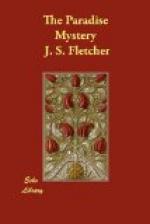The two men looked at each other as if each were asking his companion a question.
“Well?” said Mitchington at last. “You’re a cut above me, Jettison. What do you make of it?”
“I said last night that the young man was playing a deep game,” replied Jettison. “But—what game? What’s he building up? For mark you, Mitchington, if—I say if, mind!—if that fifty pounds which he drew in gold is the identical fifty paid to Collishaw, Bryce didn’t pay it as hush-money!”
“Think not?” said Mitchington, evidently surprised. “Now, that was my first impression. If it wasn’t hush-money—”
“It wasn’t hush-money, for this reason,” interrupted Jettison. “We know that whatever else he knew, Bryce didn’t know of the accident to Braden until Varner fetched him to Braden. That’s established—on what you’ve put before me. Therefore, whatever Collishaw saw, before or at the time that accident happened, it wasn’t Bryce who was mixed up in it. Therefore, why should Bryce pay Collishaw hush-money?”
Mitchington, who had evidently been thinking, suddenly pulled out a drawer in his desk and took some papers from it which he began to turn over.
“Wait a minute,” he said. “I’ve an abstract here—of what the foreman at the Cathedral mason’s yard told me of what he knew as to where Collishaw was working that morning when the accident happened—I made a note of it when I questioned him after Collishaw’s death. Here you are:
’Foreman says that on morning of Braden’s accident, Collishaw was at work in the north gallery of the clerestory, clearing away some timber which the carpenters had left there. Collishaw was certainly thus engaged from nine o’clock until past eleven that morning. Mem. Have investigated this myself. From the exact spot where C. was clearing the timber, there is an uninterrupted view of the gallery on the south side of the nave, and of the arched doorway at the head of St. Wrytha’s Stair.’”
“’Well,” observed Jettison, “that proves what I’m saying. It wasn’t hush-money. For whoever it was that Collishaw saw lay hands on Braden, it wasn’t Bryce—Bryce, we know, was at that time coming across the Close or crossing that path through the part you call Paradise: Varner’s evidence proves that. So—if the fifty pounds wasn’t paid for hush-money, what was it paid for?”
“Do you suggest anything?” asked Mitchington.
“I’ve thought of two or three things,” answered the detective. “One’s this—was the fifty pounds paid for information? If so, and Bryce has that information, why doesn’t he show his hand more plainly? If he bribed Collishaw with fifty pounds: to tell him who Braden’s assailant was, he now knows!—so why doesn’t he let it out, and have done with it?”
“Part of his game—if that theory’s right,” murmured Mitchington.




